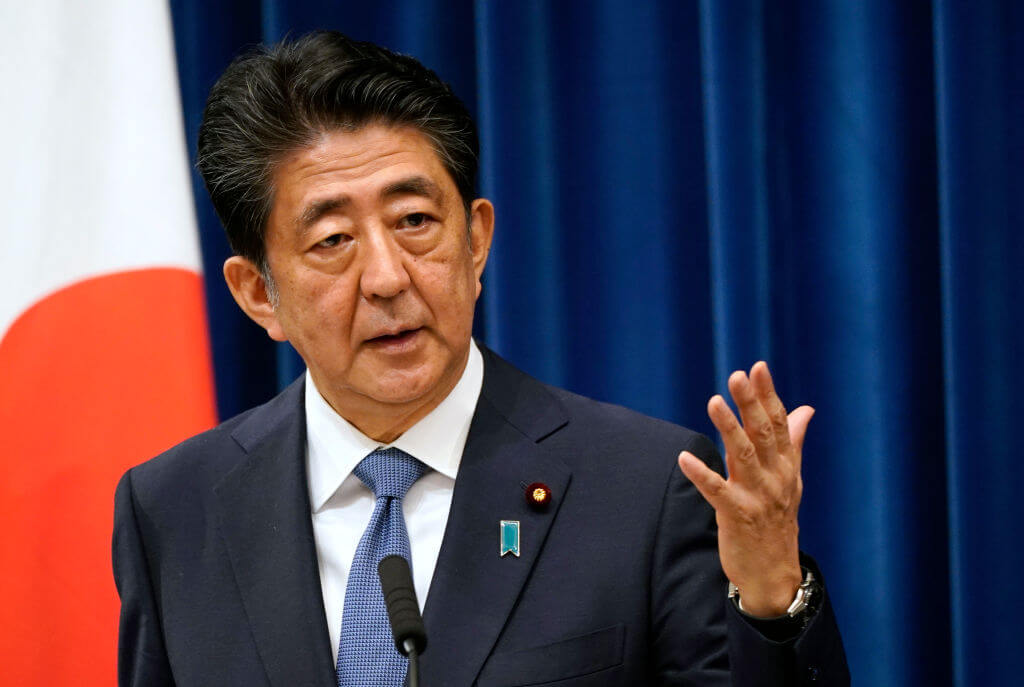Shinzo Abe, Japan’s longest-serving prime minister, improved ties with Israel, honored the Holocaust
The American Jewish Committee called Abe ‘an unstinting ally to the Jewish people and Israel,’ saying: ‘we have lost a dear friend’

Former Japanese Prime Minister Shinzo Abe, seen here in 2020, was assassinated. Photo by Getty Images
Former Japanese Prime Minister Shinzo Abe, who was assassinated early Friday while giving a speech near Kyoto, improved his country’s diplomatic and economic ties with Israel after decades of distance.
Interim Israeli Prime Minister Yair Lapid joined other world leaders in sending condolences Friday, saying on Twitter that Abe, Japan’s longest-serving prime minister, “was a fierce and distinguished leader and a key architect of modern Israel-Japan relations.”
Abe, who was 67, served twice, from 2006 to 2007 and 2012 to 2020. In 2014, he hosted then-Israeli Prime Minister Benjamin Netanyahu for a state dinner in Tokyo, and in 2015 and 2018 visited Israel for talks on Middle East peace and other matters.
“I am determined, together with Prime Minister Netanyahu, to make further efforts to strengthen Japan-Israel relations, so that the potentials are fully materialized,” Abe said during the 2014 Netanyahu visit.
The American Jewish Committee said Japan’s investment in Israel increased from $20 million when he was elected in 2012 to more than $6 billion by 2019.
In a statement, the group called Abe “an unstinting ally to the Jewish people and Israel,” saying: “we have lost a dear friend.”
During his tenure, Abe also made several trips to Holocaust-related museums and memorials.
In 2014, months after his controversial visit to a Tokyo shrine that some see as a symbol of Japan’s wartime aggression, Abe went to the Anne Frank House in Amsterdam. A foreign ministry spokesman said at the time that the visit aimed “to reiterate the lasting and profound friendship between Japan and the Jewish people around the world.”
Abe himself spoke during the visit of a “deep connection” between Japan and Anne Frank’s diary. “Looking ahead to the many years of the 21st century, I would like to ensure that we will never see the same things happening,” he said, “and I share the responsibility of realizing this goal.”
The following year, Abe visited both the Yad Vashem Holocaust Museum and Memorial and the U.S. Holocaust Museum in Washington, where he honored Chiune Sugihara, who as Japan’s representative in Lithuania during World War II, defied orders from his superiors in order to issue thousands of visas to Jews between 1939 and 1940.
At the U.S. museum, Abe and his wife each lit a commemorative candle in the Hall of Remembrance and met with three survivors who had been helped by Sugihara. “As a Japanese citizen, I feel extremely proud of Sugihara’s work,” Abe said at the time.
In 2018, Abe became the first Japanese leader to visit Lithuania, and again honored Sugihara, sometimes called the “Japanese Schindler,” with a visit to the consulate where he served.
“The courageous and humanitarian action of Mr. Sugihara provides us with guidance as to how we should survive in this world, where rule-of-law-based international order is being challenged in various forms,” Abe told reporters then.
That same year, during Abe’s visit to Israel, he and his entourage took offense when an Israeli celebrity chef, Moshe Segev, served chocolate pralines in a shoe for dessert at the prime minister’s residence.
Segev said the shoes were meant as “sculpture,” but it was an odd choice given that Japanese etiquette calls for shoes to be left outside one’s home or office.
“We can’t understand what he was trying to say here,” a Japanese diplomat said of Segev. “If it is humor, then we don’t think it is funny. I can tell you we were offended on behalf of our prime minister.”
A message from our CEO & publisher Rachel Fishman Feddersen
I hope you appreciated this article. Before you go, I’d like to ask you to please support the Forward’s award-winning, nonprofit journalism during this critical time.
We’ve set a goal to raise $260,000 by December 31. That’s an ambitious goal, but one that will give us the resources we need to invest in the high quality news, opinion, analysis and cultural coverage that isn’t available anywhere else.
If you feel inspired to make an impact, now is the time to give something back. Join us as a member at your most generous level.
— Rachel Fishman Feddersen, Publisher and CEO